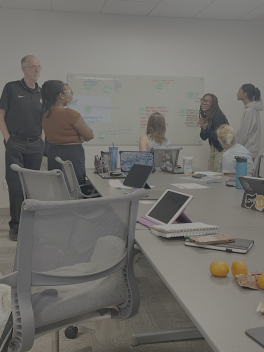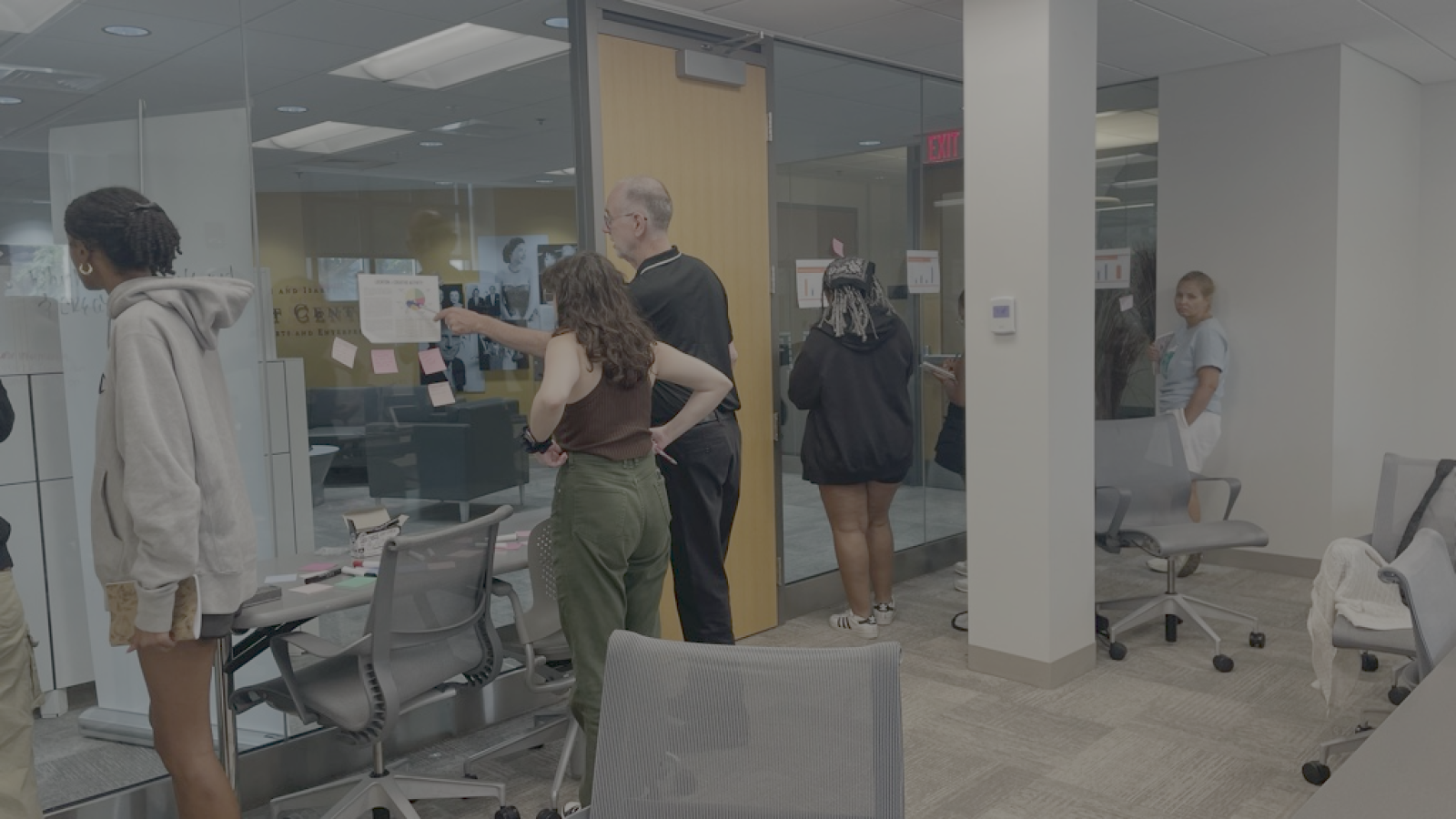Barnett Field School

The Barnett Field School is a credit-bearing course that engages students directly with timely matters and challenges affecting arts and artists across the state of Ohio, and with cultural leaders working to address those challenges. A key tool needed and used by such cultural leaders is research and evidence; hence, in addition to being exposed to current matters affecting the arts ecosystem across the state, students engage with and work toward producing data and evidence that can help inform the work of cultural leaders.
This course brings together interdisciplinary expertise in arts, culture, and creativity and its intersections with planning and policy; applied research; the role of arts and artists in community development; and deep, on-the-pulse knowledge of the arts and culture sector in Ohio and in its communities. This course seeks to run as a workshop that is focused on students’ shaping, informing, producing for distribution, and disseminating applied research of timely relevance to stakeholders of the artistic and cultural ecosystem in Columbus and other areas of Ohio with the guidance, support, and direction of the team-led workshop’s faculty.
During the 2024-25 academic year, The Barnett Field School course brought together interdisciplinary expertise in arts, culture, and creativity and its intersections with planning and policy; applied research; the role of arts and artists in community development; and deep, on-the-pulse knowledge of the arts and culture sector in Ohio and in its communities. Throughout the year, the students workshopped how to shape, inform, produce for distribution, and disseminate applied research of timely relevance to stakeholders of the artistic and cultural ecosystem in Columbus and other areas of Ohio with the guidance, support, and direction of the team-led workshop’s faculty. Specifically, student examined the artist labor force and disparities within it, nationally, in Ohio, and in Columbus. During the fall semester, the students undertook a quantitative examination of the Ohio and national artist labor force, which is captured in the Barnett Field School Issue Brief (April 2025). In the spring semester, students designed their own qualitative projects to look even more closely at the artist labor force here in Columbus, and designed and produced a zine encompassing their insights on the artist labor force. The Field School culminated in a panel with cultural leaders who spoke to the Columbus artist labor force and efforts to address disparities within it.
Click the accordion below to watch a series of panels the Barnett Fellows hosted for the 2021-2022 Barnett Field School.
The Barnett Fellows Field School hosted Power & Potentials: Justice, Equity, and Advocacy in the Arts on March 22 in the Barnett Center Collaboratory. Moderated by PhD student and Barnett Fellow De'Avin Mitchell, the panel sought to explore the intersections of advocacy and justice in the arts.
The power generated from collective and community action has the potentials to make change at the local level and beyond. This understanding of power takes into account the systemic and hierarchical structures that affect change. The panel consisted of individuals with unique histories and expertise as educators, practitioners, and innovators in the arts and cultural space. Together, the panel hoped to expand its audience's perceptions of power, justice, and advocacy through research, pedagogy, practice, and civic engagement.
Panelists included Dr. Terron Banner, Manager of Community Learning and Experience at Ohio State's Urban Arts Space; Dr. Tiffany Bourgeois, Assistant Professor in the Department of Arts Administration, Education and Policy at The Ohio State University; Dr. Antonio Cuyler, Professor of Music in the School of Music, Theatre & Dance at the University of Michigan; and Dr. Brea Heidelberg, Associate Professor in the Antoinette Westphal College of Media Arts & Design at Drexel University.
The Power and Potentials of Community Arts
As part of the Barnett Field School, the Barnett Fellows hosted a panel titled The Power and Potentials of Community Arts in March 2022. Moderated by Barnett Fellow De'Avin Mitchell, panelists included Dr. Vesta Daniel, Jackie Calderone, Dionne Custer Edwards, and Courtenay Barton.
The panel explored the power that is harnessed by community arts and community-based arts education. The power generated from collective and community action has the potentials to make change at the local level and beyond. The panel consisted of individuals with unique histories and expertise as educators, practitioners, and innovators in the community arts space. Together the panel expanded its audience’s perceptions of the potentials of community arts through research, pedagogy, practice, and civic engagement.
Panelists
Vesta Daniel, Ed.D.
Vesta Daniel is a professor emeritus of the Department of Arts Administration, Education and Policy. Her research foci are in the areas of community-based art education, issues of diversity and resistance education. Her current research addresses gentrification in a midwest city focusing on the community of Bronzeville. The premise of the research is thatcommunity-based art that is attributed or unattributed to specific creators can function as an element of resistance against community encroachment and a means of interrogating the process and results of embourgeoisement. The intent of this research is to suggest possibilities for educators and community members to include resistance as a welcome educational strategy.
Jackie Calderone
Jackie Calderone is the founding Director of TRANSIT ARTS, Artists on the Move, launched in 2007. TRANSIT ARTS is a citywide youth arts development program of Central Community House and works in partnership with the Ohio Alliance for Arts Education and a host of citywide partners. TRANSIT ARTS is rooted in a rich history of community engagement and enlists young artists, ages 12-21, in intensive programs of coaching by outstanding artists and other creatives. The program provides a variety of FREE, interactive, multi-disciplinary experiences in a safe and empowering environment.
Dionne Custer Edwards
Dionne Custer Edwards is the Director of Learning & Public Practice at the Wexner Center for the Arts where she oversees four major program areas and has pioneered several groundbreaking education programs. Embedded in her art and education practices is Dionne’s commitment to work in diversity, equity, inclusion, and access. Dionne has received awards and fellowships for her work in the arts, including a 12-month fellowship with Americans for the Arts, and two nominations, for a Greater Columbus Arts Council Community Arts Partnership award.
Courtenay A. Barton
Courtenay A. Barton joined the Council on Foundations in September 2017 as a National Urban Fellow and was hired in September 2018 as Program Manager for Arts & Culture. Courtenay has more than 12 years’ experience in nonprofit management in media, arts, and education. Prior to joining the foundation, Courtenay was the Associate Director of Stewardship at the Brooklyn College Foundation. She also had roles at New York City’s public television station Thirteen/WNET and the New York Foundation for the Arts. Courtenay earned a bachelor of arts degree in English, Creative Writing, and African American Studies from Columbia University. She also received a master of public administration degree from Bernard M. Baruch College, Marxe School of Public and International Affairs. Her Master’s thesis, “A Foundation for Equity: Philanthropic Strategies to End Racial Inequity in Cleveland” won a Philip J. Rutledge Award for Outstanding Academic Capstone Achievement.

